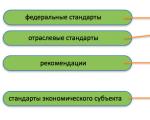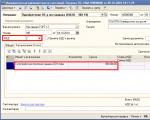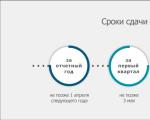Penalty for late transferred personal income tax. Tax authorities will stop fining everyone for personal income tax
The tax office can no longer fine an entrepreneur for late payment of personal income tax if he has repaid the debt himself. The reason for the delay does not matter. This decision was made by the Constitutional Court in the case of one entrepreneur.
During an on-site audit, the tax office discovered that the company transferred personal income tax late. Inspectors issued a fine of 299,403 rubles and a penalty of 4,896 rubles. The businessman did not agree with the fine and went to court to prove that he did not have to pay the fine because he managed to correct the mistake before the tax office arrived. The city, district and regional courts rejected the businessman, and the Supreme Court did not even accept the complaint. Then he appealed to the Constitutional Court. Well done, the Constitutional Court confirmed that the entrepreneur was right and allowed him not to pay the fine.
Constitutional Court decision on fines
dated 02/06/2018 No. 6-P
Tax authorities will no longer be able to fine entrepreneurs who independently corrected the violation - the decision of the Constitutional Court is binding on everyone.
What does it mean?
If a businessman does not remit personal income tax on time, he is subject to a fine of 20% of the unpaid amount of taxes (Article 123 of the Tax Code of the Russian Federation).
It happens that a businessman makes an error in accounting or fills out a declaration incorrectly. There will be no fine if he corrects the error, pays the missing amount of tax and submits an adjusting return. Even if it happens after the tax deadline. The Tax Code provides for two such cases (clause 4 of Article 81 of the Tax Code of the Russian Federation):
- If a businessman paid the missing amount of tax and filed an amended return before he learned that the tax authorities had discovered an error or scheduled an on-site audit.
- If a businessman filed an updated declaration after an on-site inspection, during which the inspector did not find any errors that underestimated the amount of tax.
In our case, the businessman correctly completed the declaration, but was late in paying the personal income tax for his employees. Despite the fact that he himself corrected the violation and paid a late fee before the tax authorities discovered it, the inspector imposed a fine. The tax office considered: since the businessman did not correct anything and did not submit an updated declaration, then clause 4 p. 81 of the Tax Code of the Russian Federation does not apply to it. This means that sanctions in the form of a fine can be imposed.
All courts supported the position of the tax authorities, but the Supreme Court did not accept the complaint. Then the businessman appealed to the Constitutional Court to check the constitutionality of the provisions of Art. 123 of the Tax Code of the Russian Federation and clause 4 of Art. 81 Tax Code of the Russian Federation. The court ruled that the provisions of the articles do not contradict the constitution, but confirmed that the businessman was right. If a businessman paid the debt and late fees for personal income tax before the tax authorities found out about the violation, he does not have to pay a fine. The reasons for the delay do not matter. A precedent has emerged.
How will this affect businessmen?
Previously, tax authorities fined entrepreneurs for delays in personal income tax, if it was not related to errors in the declaration. Even if the businessman corrected the violation himself. Now the inspector will not be able to issue fines regardless of the reason for the delay. The main thing is to correct the violation before the tax authorities discover it. If a fine is nevertheless imposed, you can safely sue the tax office. Given the precedent, winning the case will not be difficult.
Let's summarize
If your personal income tax payment is late, correct the violation before the tax office discovers it. Then you won't be fined. The reason for the delay does not matter. If the inspector still imposes a fine, you can safely sue the tax office. The decisions of the Constitutional Court are binding on everyone, so winning the case will not be difficult.
is a fair question that many business owners ask. Personal income tax is a tax calculated as a percentage of the total income of individuals. All company owners who are employers must pay personal income tax on time. But, unfortunately, this does not always work out. In this article we will tell you how not to end up in the “penal battalion”.
What the law says
Interaction with the tax service occurs in accordance with the rules established by the legislation of the Russian Federation. This means that fines must also occur in accordance with official regulations. If you have been fined unreasonably, you have the right to have your personal income tax fine reduced. To reduce or completely challenge a fine, you need to know some provisions of the law. With this knowledge, you can avoid imposing a fine in advance or challenge it if it is unfair and unreasonable.
The basic rules in accordance with which the penalty is calculated are prescribed in Art. 70 Tax Code of the Russian Federation. Here you will find information regarding the deadline for notifying the taxpayer of a fine. If the tax inspectorate does not comply with the requirements, it can be concluded that the law has been violated. In the future, this fact may play into the hands of the taxpayer, as well as other mitigating circumstances, the presence of which makes it possible to submit a petition for a personal income tax fine to reduce or cancel it.
Extenuating circumstances
To avoid a fine for late payment of tax or other personal income tax violations, you need to be aware of mitigating circumstances that can help you. But keep in mind that the attitude of different tax authorities and court representatives to such “indulgences” is not the same. If such circumstances are discovered by the tax inspectorate, it is very difficult to get them to cancel the decision. In practice, tax authorities themselves reduce fines in 5% of cases or less, while courts, on the contrary, more carefully consider the circumstances of the case and reduce fines several times and with greater frequency. However, going to court is not a panacea either.
Circumstances can be classic (traditional) or atypical.
Classic mitigating circumstances
These are the circumstances that occur most often. These include the following:
- Previously, the entrepreneur was not brought to tax liability. Here is an example of a precedent for a court overturning a tax decision for this reason. However, Russian law is not a case law, so resolving the issue on this basis falls to the court.
- Absence of malicious intent or inability to prove it.
- Repentance for what you have done, recognition of your own guilt, understanding of the seriousness of the situation.
- The conscientiousness of the company owner in relation to the payment of other tax contributions (this circumstance may act as a mitigating factor, but will not be a guarantee that the punishment will be mitigated or cancelled, since this conscientiousness should be the norm).
- Company recognition.
- Poor financial condition of the entrepreneur, presence of other debts, threat of bankruptcy.
- The company does not have a full-time employee responsible for accounting work. Circumstance mitigates guilt not if the company simply did not care about its availability, but for a more compelling reason. For example, an employee is on vacation, on sick leave, or quit, and a replacement has not yet been found to replace him. This circumstance also cannot be considered a full justification, but the court may reduce the amount of the fine.
- Status of a budgetary institution.
- Status of a city-forming enterprise.
- Conducting social or charitable activities, supplying food and other types of material goods to government institutions (boarding schools, orphanages, etc.).
Unusual mitigating circumstances
This list is rather arbitrary, since non-standard circumstances are therefore non-standard. This information was collected from actual court cases that resulted in sentence reductions.
- If the taxpayer is assessed a fine that is too large relative to the amount of nonpayment, this may serve as a mitigating circumstance because it is disproportionate to the severity of the violation that is charged to the taxpayer. But it makes sense to talk about disproportionality if the tax has been paid by the time of the court hearing.
- It is important to pay attention to the delay time. If the deadline for missing tax payments is insignificant (from 1 to 10 days), you can count on loyalty.
- If the taxpayer independently found and corrected errors, this may serve as a mitigating circumstance. In this situation, the overall responsibility and performance of the taxpayer is usually assessed. If he has overpaid other tax contributions, this may serve as a mitigating circumstance.
- If the taxpayer has not submitted documents to the inspectorate upon request, specialists pay attention to additional factors. For example, was the volume of documents requested excessive? The reasons for the loss of documents are also clarified: if they were lost as a result of a technical failure, fire or other force majeure, this will be qualified as a mitigating circumstance.
In addition, there are individual reasons, including the taxpayer’s disability, serious illness, or old age.
Petition to cancel or reduce the fine
The tax office must consider each situation in detail and identify mitigating circumstances on its own. But there is no hope for this. In practice this rarely happens. It is best to find all the facts that can play into your favor and draw up a formal petition.
The petition must indicate that it is being sent to take into account mitigating circumstances and list them. If the application is rejected or ignored, you must take a second step and send a request to the Federal Tax Service. If the highest tax authority does not respond to your request or refuses to consider it, you must go to court. Going to court does not have to be the third step. You can submit a request immediately, without going to the inspectorate.
Personal income tax is a tax that a company withholds from an employee’s salary. The personal income tax rate is 13%. The company transfers the withheld amount to the health and social insurance funds, as well as to the pension fund.
Personal income tax is calculated using the following algorithm:
- the income of company employees is summed up;
- deductions for benefits are calculated. They are standard, when their amount depends on the number of children, property (sale of residential houses, apartments, etc.) and social (expenses for study, treatment of yourself and your relatives, for charity);
- the value that was obtained when calculating deductions is subtracted from the total amount of employee income;
- The resulting amount is then multiplied by 13%.
There are two personal income tax certificates that the company is required to submit to the tax office. The first is 2-NDFL. This document contains the details of the enterprise, information on wages and withheld income taxes for each employee. The company must submit a 2-personal income tax certificate to the tax office before April 1 of the following year after the reporting year.
The second certificate is 6-NDFL. It indicates the summary amount of income and withheld taxes for all employees. The company is required to submit this certificate to the department for the following periods:
- for the reporting year - no later than April 1 of the following year;
- for the first quarter - no later than May 3;
- for six months - no later than July 31;
- nine months - no later than October 31.

By law, the company must transfer the personal income tax withheld from wages to the tax office on the day the employee received his salary. An enterprise can also transfer the withheld personal income tax on the next working day after the employee receives earnings. If the company does this later, it will receive a fine. Its size is 20% of the amount that was transferred to the tax service late. If the company did not transfer the full amount to the government agency, it will also be fined.
The reason that changed the law
In some past, one company was fined by the tax office for late submission of personal income tax. The fine amounted to 300 thousand rubles. However, the company challenged this decision in court: company representatives argued that it had no personal income tax debts when it submitted reports to the tax service. The company managed to pay off the arrears along with penalties even before submitting reports to the state body.
As a result, the court sided with the company, and later amendments were made to Article 123 of the Tax Code of the Russian Federation, which allow a legal entity to avoid a fine for late payment of personal income tax.
How is this possible?
It is possible to avoid personal income tax fines if the company has paid off the debt and penalties before submitting the update to the tax service. However, she must pay off the debt and penalties before the tax office finds out about it. Tax specialists can find out about it using the primary 6-NDFL: the document indicates payments for which the company has debts. The company will be forced to pay a fine if the department has identified tax debts.
What will help you avoid fines for non-payment of personal income tax?
With the help of the VLSI electronic reporting program, you will submit correct reports to regulatory authorities in a timely manner. The system allows you to conduct financial analysis and assess tax risks, generate reports and check them in accordance with regulatory requirements for format and content. Thanks to the VLSI electronic reporting program, you will be able to receive certificates and extracts from the tax office, statements of reconciliation of payments online, check partners and affiliates for reliability, and much more.
The system is constantly updated in accordance with all changes in legislation. It can also be integrated with most accounting programs.
Please note that to submit reports via the Internet, you will definitely need an electronic digital signature. Thanks to the EDS Center service, you will purchase an electronic digital signature at the best price.
All your questions related to personal income tax, reporting and VLSI products will be answered by ours. At our events you will also find answers to questions related to electronic trading, accounting, optimization and automation of business processes.
There is just over a month left until the tax return filing deadline. Go Banking Rates has found that a small segment of the population has discovered loopholes to avoid paying some income tax - legally.
1. A drunk driver turns a DUI into a tax deduction.
Justin Rohrs managed to get his truck off the embankment in 2005 only to collect insurance payouts after driving while intoxicated. He claimed insurance on his $33,629 pickup truck. After the insurance company denied his claim, he attempted to claim the loss of his vehicle as a tax deduction.
Rohrs filed a lawsuit in U.S. Tax Court, arguing that he deserved to have the loss of the truck deducted from his tax return. The judge agreed and allowed him to do so.
2. Cats are very expensive
Jan Van Dusen is a cat lover. She has more than 70 cats in her house. She cared for the animals, but then released some of them into the wild. Although most often I left my furry friends at home.
The cost of caring for cats began to mount for Van Dusen, so she filed a 2004 tax return trying to write off $12,068 in cat rescue items such as food, vet bills, paper towels and more. After the IRS told her that these expenses were considered personal and the service could not deduct them, she sued the IRS. After a long battle, Van Dusen proved that caring for the cats was a charity, resulting in the IRS finally providing deductions for most of her claims.
3. An exotic dancer's breast implants are a business expense.
Cynthia Hess, also known by her stage name Tonda Marie, was an exotic dancer who wanted to improve her business by eliminating her "hereditary defect." In other words, she needed bigger breasts. After she had breast augmentation, her business began to grow.
Hess, now known as Chesty Love, decided to deduct her implants as a business expense. The IRS denied her request, saying that business deductions only work in circumstances that are ordinary and necessary.
Hess sued the IRS, arguing that her new breasts should be considered a business uniform. She continued to say that she planned to have them removed immediately after leaving the business and only had her breasts enlarged for business purposes.
4. Even drug dealers get tax deductions
Drug dealer Jeffrey Edmondson may be giving master classes on how to legally avoid paying taxes. He got into trouble with the law after he was arrested and accused of drug trafficking. In an effort to get even more from the dealer, the IRS fined him $17,000 in back taxes because he failed to declare his drug income.
Edmondson decided the government would not “have the last laugh.” In summing up his trial, he filed a tax return showing his taxable net income along with a list of business deductions. After looking at the tax refund, the IRS rejected the deductions. But Edmonson decided to go even further.
He filed a claim in tax court where he claimed to have founded a home-based business and claimed a deduction for home office expenses, including drugs. Surprisingly, the judge agreed to allow him to deduct expenses, which included a $50 scale, more than 19,000 miles on his car and 100 pounds of marijuana.

3 Easy Ways to Legally Avoid Taxes
You may not want to sue the IRS every time you give up a tax deduction, but you can benefit by learning how to legally avoid paying taxes. Here are three options to legally avoid paying taxes:
1. Qualification for tax credits
Many people don't realize that a tax credit is the equivalent of free money. Tax deductions reduce the amount of taxable income you can claim, and tax credits reduce the tax you owe and, in many cases, result in a nice refund.
The IRS offers a large number of tax credits that cover everything from purchasing energy-efficient products for your home to a low-cost, moderate-income home. The key to benefiting from them is to look at all the purchases you made throughout the year.
2. Use adjusted deductions
Most people take the standard deduction available to them when they file their taxes to avoid having to provide proof of all the purchases they made during the year.
But if you've made significant payments for mortgage interest, property taxes, medical expenses, local and state taxes, or made large charitable contributions, it might be worth it. These tax deductions are subtracted from your adjusted gross income, which reduces your taxable income.
3. Enroll in college
One way to take advantage of tax credits or credits is to enroll in college.
Students who are not eligible for credits must consider tax deductions. The government allows students to deduct up to $4,000 from the cost of tuition, fees and course materials. Although it is not as valuable as a loan, deductions can significantly reduce taxes.
Also, keep in mind that financial assistance in the form of grants and work study offers tax-free money that is not considered taxable income. Scholarships also help pay for school and are not taxable if the money is used for educational purposes.
There's no doubt that it's legally impossible to evade taxes, but by taking advantage of credits and deductions, you can improve your chances of doing so.
Officials from the Federal Tax Service have already brought the court decision to the inspections and demanded that they be taken into account in their work (letter dated 02/09/2018 No. SA-4-7/2548). Now there should be no penalties for minor tax delays.
The company is obliged to transfer the withheld personal income tax maximum on the next business day after the employees received the money. For tax delay, the fine is 20 percent of the amount that was transferred late (Article 123 of the Tax Code).
As a general rule, fines for arrears can be avoided
If you pay the debt and penalties before submitting the clarification (clauses 4, 6 of Article 81 of the Tax Code). Moreover, this must be done before the tax authorities find out about the error. From the primary 6-NDFL, inspectors can immediately see for which payments the company withheld tax. If the tax is overdue, the company is issued a fine.
Based on the results of the 6-NDFL cameras, inspectors fine even those who were minimally late with their taxes - for example, by one day.
The Constitutional Court is against such an unfair approach
The judges considered the application of a company that was late with the payment of personal income tax due to technical reasons. For this, the tax authorities fined her 300,000 rubles. (Article 123 of the Tax Code). In court, the company stated that at the time of filing its reports it had no personal income tax debts. She voluntarily paid off the arrears along with penalties before the inspectors found out about her.
The judges agreed with these arguments. In their opinion, a fine can be avoided even if the company pays off the arrears before submitting the initial report, and not just before sending the clarification. Comments from the company that challenged the fine, an official from the Federal Tax Service and an independent tax lawyer are on the page below.
If you find yourself in the same situation as the company from this dispute, and inspectors demand a fine, refer to the new letter from the Federal Tax Service and the decision of the Constitutional Court. This way you can avoid liability for tax delays, which the company did not have at the time of filing 6-NDFL.




